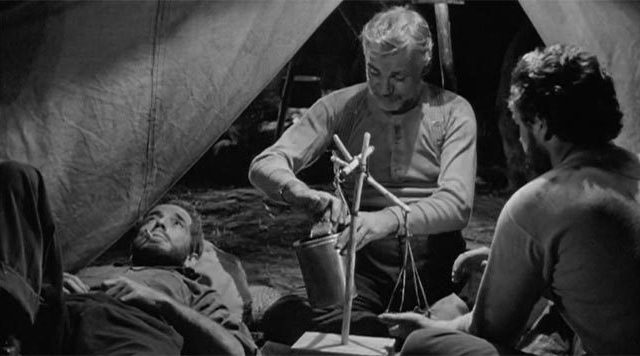Is it just me or did The Treasure of the Sierra Madre age shockingly well? Dig just a bit under the surface and you’ll find a ton of progressive lessons in there. It values community over capitalism and paying respect to the environment over exploiting it. The Mexican characters were even unique and played by Mexican actors who don’t recognize American values and currency, which leads to a God-is-a-practical-joker conclusion.
It also plays like an especially good episode of The Twilight Zone, seeing how man is the real monster here and the central story concerns the power dynamics of a trio exploring the wilderness. I’m not much of a fan of the classic western tropes, so I was happy that the shootouts and horse chases were kept to a minimum. They’re just gold mining, which I do know something about having grown up in the San Francisco Bay Area. I’ve sifted through the dust and dirt and water to find flecks of gold on 4th grade field trips.
Bogie is against type here as Dobbs. He’s still grizzled, but he’s also The Worst. He’s so hateful and conniving. He’s also much more energetic than his characters usually are. You really see how scrawny he is because he’s constantly sizing everyone else up, wondering how he can get them before they get him. I’d hesitate to call him paranoid, as it’s not unwarranted fear, but Bogie is creating an environment for it to thrive in and he has the power to greatly lessen the chances of things turning out that way.
An old gold mining veteran, Howard, played by John Huston’s dad (awwwww!) William Huston, foreshadows this environment when Bogart and Tim Holt as Curtin (the normal one) meet him and immediately ask him what he’s doing in the shelter if he knows so much about gold mining. Huston never answers, but the question sticks in the audience’s mind. Since no more specific answer comes to light, I think we can assume that what happened to this trio is what usually happens: gold mining trips go sour when someone gets greedy and swindles everyone out of their shares.
Huston is a joy to be around. I loved how knowledgeable he was and how much better he was at climbing mountains than the two younger men (who refer to him as part goat). Huston even manages to stan for environmentalism, decades before the environmental movement started as we know it today. He convinces the group to stay an extra week to put the mountain back together after taking all her riches. It’s implied that someone as nice and easygoing as Huston will never be the one to come out at the end with the gold. He’ll always get swindled as greed sets in.
I especially loved how good Huston is at lying when a fourth man shows up. Bogie is just glowering and threatening him, giving away their mission with his paranoia, but Huston lies easily. They’re just on a hunting trip. Nothing to see here. I also love when Huston sees Bogie in such a bad mood (as he always is) and asks him what must be the prototypical version of “panties in a bunch?”: “Got something up your nose? Sneeze it out! You’ll feel better!”
The central issue in Treasure of the Sierra Madre is one of wealth, property, and community. At the end of their first profitable day, Bogie suggests they divide up the gold every day. Holt wants to wait until they get into town and just divide up the money after they exchange the gold for cash. Huston seems apathetic, but doesn’t relish the responsibility of guarding others’ gold, which also hints at one of his previous expeditions we’ve never seen. Was Huston put in charge of a group’s gold on a previous trip and then blamed when someone stole it? If this group trusted each other, there would be no question that they should keep the gold communal until cashing out. But they don’t, so they don’t. In a communal gold situation, there’s fear that someone will be sneaking some off the top of the communal share, but that nagging question does not compare to the fear everyone has once they’re given their own share of gold every night. When someone’s after “your” gold, paranoia grows faster.
I liked that Bogie’s greed was consistent with his plans after he cashes out. Huston plans to save his share and assumes he can spread it out enough to enjoy it for the rest of his years. (It’s hilarious when such a gnarled cynical man as Bogie shouts to the old but Santa Claus-like Huston, “You’re old! I’m young!”) Holt plans to invest his money in peach orchards. He’s clearly thinking long term and not afraid of a little hard work. And Bogie plans to use it to turn into an even bigger asshole. He wants to spend, spend, spend, and buy the status he needs to send things back as he pleases. No wonder he’s greedy. That’s a surefire way to lose your fortune fast.
And indeed, the ending, (which I won’t spoil here, but is foreshadowed the first time Bogie decides he wants some of Holt’s share), seems to be a practical joke about what America values vs. what Mexicans value and how silly currency is to begin with. Some people think the ending is pessimistic, but what I see is the asshole getting what he deserves and the awesome one is set for the rest of his life, which is all he really wanted anyway.


